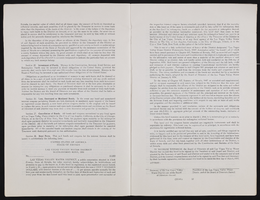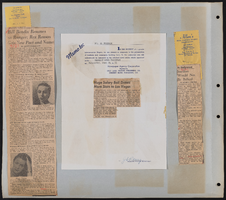Search the Special Collections and Archives Portal
Search Results
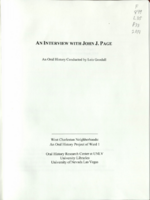
Transcript of interview with John Page by Lois Goodall, April 16, 2014
Date
Archival Collection
Description
John J. Page attended 13 schools before graduating from high school in the Ozark Hill Country of Oklahoma. Although he engaged in no combat, he was drafted into military after completing two years of college at the University of Oklahoma in Norman, Oklahoma. After his discharge from the U.S. Air Force, he helped his wife, Reitha, finish the credits she needed to complete her degree, and he then worked to complete his in Norman. Following his graduation, the couple relocated to Las Vegas in February 1959, when Reitha found a job at Washington Elementary School. In Las Vegas John completed his practice teaching under master teacher Lamar Terry at Twin Lakes Elementary School and under supervision of Dr. Holbert Hendrix at the University of Nevada, Las Vegas. John held his first teaching assignment, fifth grade at West Charleston Elementary School (later called Howard Wasden Elementary School), for 27 years before transferring with his principal to Helen Marie Smith Elementary School. For a time John and Reitha rented a small house at the comer of Bonanza Road and First Street that was owned by entertainer Horace Heidt. They bought their first house, a Pardee Park Home one block north of Tom Williams Elementary School in North Las Vegas, because Reitha taught there, and she and the children could walk to school together. In 1973 they bought their current house on El Cortez Avenue in the Westleigh tract. Page not only worked in Ward 1 for 27 years of his 36-year teaching career (1959-1995); he and his family also lived in Ward 1 for more than forty years. As a teacher in the school that served the wealthiest Las Vegas families, Page witnessed the many ways that generous donations of time, money, and talent matter to schools, students, and teachers. As an early resident of Westleigh tract, Page saw dramatic changes to the area's built environment. And as a longtime educator, Page observed several cycles of experimental instmctional techniques and philosophies.
Text

Interview with Roger Ray, October 29, 2005
Date
Archival Collection
Description
Text

Interview with James Ogle, April 6, 2005
Date
Archival Collection
Description
Text

Paul Velez oral history interview: transcript
Date
Archival Collection
Description
Oral history interview with Paul Velez conducted by Barbara Tabach on February 22, 2018 for the Remembering 1 October Oral History Project. In this interview, Paul Velez, a University of Nevada, Las Vegas (UNLV) campus officer, discusses his experience at the Thomas & Mack Center during the night of the October 1, 2017 mass shooting in Las Vegas, Nevada. He shares his goal of creating a safe atmosphere for the survivors and providing them with all of their needs, including helping separated survivors find their loved ones and friends. Velez also describes his move to Las Vegas in 2008 and his time with the New York City police force, talking about his experience as a first responder at Ground Zero during the 9/11 attacks. He discusses the effect these attacks have had on general and campus security measures and on him as an individual.
Text
Brian Knudsen (City of Las Vegas Councilman) oral history interview conducted by Kelliann Beavers: transcript
Date
Archival Collection
Description
From the Lincy Institute "Perspectives from the COVID-19 Pandemic" Oral History Project (MS-01178) -- Elected official interviews file.
Text
Renee Diamond Papers
Identifier
Abstract
The Renee Diamond Papers date from 1972 to 2000 and consist primarily of political and professional materials including reports, correspondence, publications, newsletters, and planning documents collected by Diamond throughout her career. Diamond supported the feminist movement as a member of the National Organization for Women and held leadership roles in the Democratic party in Las Vegas, Nevada. The collection also documents Diamond’s campaigns for the Nevada State Assembly and includes material from her one term in the legislature.
Archival Collection
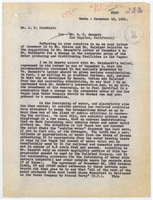
Letter from W. R. Rouse (Omaha) to A. E. Stoddard, December 18, 1951
Date
Archival Collection
Description
Suggestions that the Railroad should develop its own water so that it will not be subject to rationing as experienced by other water districts. Dividing the water production from all other assets of the Las Vegas Land and Water Company may be the best option for the Railroad to protect its water rights.
Text
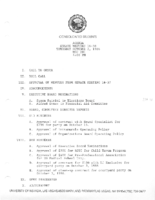
Meeting minutes for Consolidated Student Senate University of Nevada, Las Vegas, October 2, 1986
Date
Archival Collection
Description
Text

